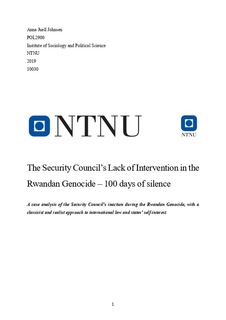| dc.description.abstract | Outline
In this bachelor thesis, I will perform a case analysis of the Security Council’s inaction during the Rwandan Genocide, with a classicist and realist approach to international law and states’ self-interest.
I will first clarify my choice of method and theory. Then I will define the central terms and definitions of the state, sovereignty, and humanitarian intervention. Subsequently I will recount the two theories of classicism in international law and realism regarding the behaviour of states in relation to institutions.
The second part makes the empirical body of my text and is divided into two different parts. First, I will discuss classicism’s understandings of the UNs charters and laws regarding humanitarian intervention, state sovereignty and the guidelines for intervention in the case of genocide. In the second part of the empirical material I will recount the council’s concrete reaction to the Rwandan Genocide. I will look at some of the most basic elements of the events leading up to the genocide as well as the genocide itself, and the discussions in the council during the genocide.
Following the empirical review, I will perform my analysis and discuss why the council failed to intervene in Rwanda, with the theories of Realism and Classicism as my analytical tools. First analysing the classicist interpretation of the international laws of the charter, compared to how these actually were interpreted by the council. After this, the realist theory will analyse the behaviour of the states in the Security Council as something that is determined by self-interest rather than the laws and regulations in the UN charter.
I will conclude with the fact that the Security Council’s lack of intervention in the Rwandan Genocide cannot be explained by the classicist approach to laws and regulations in the charter due to the changed perceptions of sovereignty, the former violations of this law, clearly demonstrating that the council did not use a classicist approach to their own laws. The realist approach on the other hand, can explain the Security Council’s inaction as mainly a result of self-interest, and the wish to defend itself, as well as maintaining its power and control in the international community. Therefore, my answer to the research question of this paper claims that it was not the laws and regulations that stopped the Council from intervention in Rwanda, but the self-interest and policymaking of the member states in the Security Council. | |
